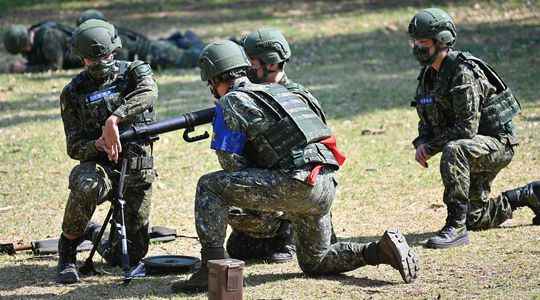In one of the many street restaurants in Taipei, in the heart of a bustling district of the Taiwanese capital, images of the war in Ukraine are looping on the television screen. A news channel praises the courage of Ukrainian President Volodymyr Zelensky and his people, then a debate starts: “And we, what would we do if China attacked?”
Since the election in Taiwan of sovereignist President Tsai Ing-wen in 2016, Chinese President Xi Jinping has hammered the island’s “inalienable” belonging to China and his intention to recover it, if necessary by force. Chinese military aircraft incursions into the Taiwanese Air Defense Identification Zone are becoming more frequent – 969 in 2021, more than double the number in 2020. These threats had failed to alarm Taiwanese, sometimes considered too careless. Until Russia invades Ukraine.
The media and politicians began to multiply the parallels between Ukraine and Taiwan. “This war is bringing about real awareness. It raises the question of autonomy, because it shows that the United States will not necessarily come to the aid of Taiwan”, summarizes Marcin Jerzewski, researcher at Nextgen, an independent think tank based in Taipei. And to add: “There is a change in the way decision-makers conceive of national security issues; and a rebound in the importance given to the army.” But also a real jump in the population: 70% of Taiwanese now say they are ready to fight in the event of an invasion, according to a recent survey, compared to 40% before the conflict.
Inadequate military service
Taiwanese experts are keeping a close eye on Ukraine’s resistance to the Russian military. “The objective of any invasion by the Chinese Communist Party would be to occupy Taiwan, Taiwanese Defense Minister Chiu Kuo-cheng said. They are already capable of taking Kinmen and other outer islands [NDLR : de l’archipel taïwanais], so why didn’t they? Because they need to be sure they can get a quick win. Otherwise, they will find themselves in the same situation as Russia in Ukraine. That’s what makes them think.”
A sign of the desire to increase resistance capacities – even if this reform was launched before the war – the training of reservists has just been reinforced. The training has increased to fourteen days once a year, instead of seven days every other year so far. It will also become more intense. President Tsai indicated that these reservists could play an important role in the defense of Taiwan in the event of an invasion, referring directly to Ukraine.
At the same time, the debate is mounting on the effectiveness of military service, reduced from one year to four months in 2013. “The level is insufficient”, underlines Marcin Jerzewzki. Since the invasion of Ukraine, many have been calling for the return of a two-year service. Nearly 70% of Taiwanese now support its extension.
For many citizens, the conscription system is a waste of time. “If China attacked, we wouldn’t know what to do,” admits Julian, who does his military service in the south of the island and spends his days “washing the floor” and other chores.
neighborhood defense
Despite the current security awakening, the panic is far from reaching the whole of society. “My entourage does not care about Ukraine or what could happen in Taiwan, observes Chiu Hsiao-Tzu, 28, a Chinese teacher in Taipei. But I worry. For two years, we have been a bit like frogs in a hot water bath. You feel good there, you don’t feel the temperature rising.”
The relationship between the population and the military is also marked by the wounds of the past: “Taiwan endured one of the longest periods of martial law in the history of mankind”, extended from 1949 to 1987, when the nationalist troops from China retreated to the island, recalls Marcin Jerzewski.
This specialist recommends the formation of territorial defense forces in the 184 cantons of Taiwan. “The idea is to hire the armed forces for neighborhood defense, but also firefighters, medical personnel…” For the time being, initiation courses in war situations and other self-defense workshops are attacked. “What is happening in Ukraine increases our sense of urgency,” said Enoch Wu, founder of the NGO Forward Alliance. In 2020, this former special forces non-commissioned officer launched training to teach civilians how to react in the event of a disaster. “I don’t ask myself any questions about the willingness of Taiwanese to unite and help others in the event of a conflict; what we need to know now is how.”
